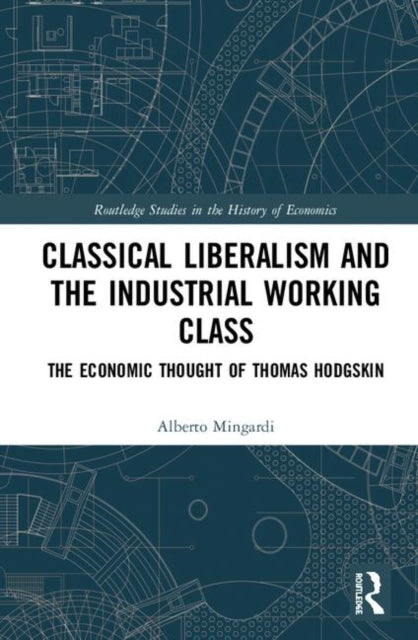AlbertoMingardi
Classical Liberalism and the Industrial Working Class: The Economic Thought of Thomas Hodgskin
Classical Liberalism and the Industrial Working Class: The Economic Thought of Thomas Hodgskin
YOU SAVE £6.96
- Condition: Brand new
- UK Delivery times: Usually arrives within 2 - 3 working days
- UK Shipping: Fee starts at £2.39. Subject to product weight & dimension
Bulk ordering. Want 15 or more copies? Get a personalised quote and bigger discounts. Learn more about bulk orders.
Couldn't load pickup availability
- More about Classical Liberalism and the Industrial Working Class: The Economic Thought of Thomas Hodgskin
Thomas Hodgskin was a committed advocate of laissez-faire economics and labor-saving machinery and the Industrial Revolution, placing him in the tradition of classical liberalism. This book explores his economic thought and his interest in the well-being of the working classes.
Format: Hardback
Length: 150 pages
Publication date: 21 July 2020
Publisher: Taylor & Francis Ltd
Thomas Hodgskin ({PHONE}) is a largely unknown figure, often considered a forerunner of Karl Marx. However, a closer look at Hodgskin's works reveals that he was actually a committed advocate of laissez-faire economics and enthusiastic about labor-saving machinery and the Industrial Revolution, with a genuine interest in the well-being of the working classes. This book places him in the tradition of classical liberalism, where he belongs as a disciple of Adam Smith, but even less tolerant of government power than Smith was.
Classical liberalism is a political and economic philosophy that emphasizes individual freedom, limited government, and free market capitalism. It originated in the 18th century in Europe and was influenced by thinkers such as John Locke, Adam Smith, and Jean-Jacques Rousseau. Classical liberals believe that individuals should be allowed to pursue their own interests and that government should only intervene to protect individual rights and promote economic prosperity.
Thomas Hodgskin was a prominent classical liberal who played a significant role in the development of economic thought in the 19th century. He was a professor of political economy at the University of London and was known for his advocacy of laissez-faire economics and his support for labor-saving machinery. Hodgskin believed that the Industrial Revolution was a positive development that would improve the lives of the working classes by increasing their productivity and reducing their labor costs. He also believed that government should not interfere in the economy, except to protect individual rights and promote economic prosperity.
Hodgskin's economic thought was influenced by the ideas of Adam Smith, who is considered the father of classical liberalism. Smith's book "The Wealth of Nations" argued that the wealth of a nation is created by the efforts of its citizens and that government should not interfere in the economy except to promote economic prosperity. Hodgskin agreed with Smith's ideas but believed that government should also play a role in promoting social welfare. He believed that the government should provide education and healthcare to the working classes and that it should also regulate the economy to prevent monopolies and other forms of economic abuse.
Despite his advocacy of laissez-faire economics, Hodgskin was also concerned about the well-being of the working classes. He believed that the Industrial Revolution had created a new class of workers who were often exploited and abused by their employers. He argued that the government should provide workers with protections against exploitation and that it should also regulate the labor market to ensure that workers are paid fair wages and have access to good working conditions.
Hodgskin's economic thought was also influenced by the ideas of Jean-Jacques Rousseau, who believed that the government should protect the interests of the working classes and that the economy should be managed by the people rather than by the government. Hodgskin agreed with Rousseau's ideas but believed that the government should also play a role in promoting economic prosperity.
In conclusion, Thomas Hodgskin was a prominent classical liberal who played a significant role in the development of economic thought in the 19th century. He was a committed advocate of laissez-faire economics and enthusiastic about labor-saving machinery and the Industrial Revolution, with a genuine interest in the well-being of the working classes. His economic thought was influenced by the ideas of Adam Smith and Jean-Jacques Rousseau and was characterized by his belief in individual freedom, limited government, and free market capitalism. Despite his advocacy of laissez-faire economics, Hodgskin was also concerned about the well-being of the working classes and believed that the government should play a role in promoting social welfare and protecting workers from exploitation.
Weight: 396g
Dimension: 160 x 241 x 17 (mm)
ISBN-13: 9780367193621
This item can be found in:
UK and International shipping information
UK and International shipping information
UK Delivery and returns information:
- Delivery within 2 - 3 days when ordering in the UK.
- Shipping fee for UK customers from £2.39. Fully tracked shipping service available.
- Returns policy: Return within 30 days of receipt for full refund.
International deliveries:
Shulph Ink now ships to Australia, Belgium, Canada, France, Germany, Ireland, Italy, India, Luxembourg Saudi Arabia, Singapore, Spain, Netherlands, New Zealand, United Arab Emirates, United States of America.
- Delivery times: within 5 - 10 days for international orders.
- Shipping fee: charges vary for overseas orders. Only tracked services are available for most international orders. Some countries have untracked shipping options.
- Customs charges: If ordering to addresses outside the United Kingdom, you may or may not incur additional customs and duties fees during local delivery.


